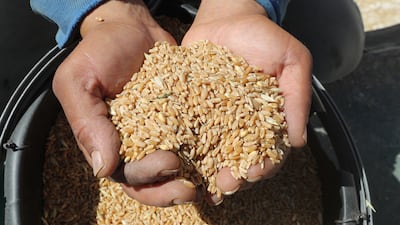Tunisia’s state-owned Office of Cereals has offered Russian grain companies a potential purchase agreement in hopes to secure regular grain shipments at a fixed price range, Russian state agricultural export agency Agroexport said on Thursday.
The offer came following a meeting - the first of its kind - between representatives of Russian and Tunisian grain companies, which was mediated between the two countries’ Ministers of Agriculture.
Tunisia has been trying to stabilise its domestic market needs of different grain types as it continues to struggle with unstable and decreasing harvest year after year due to rising temperatures and lengthy drought seasons.
“Tunisia meets about 70 per cent of its grain needs through domestic production, but the harvest greatly varies from year to year due to weather factors,” Salwa Ben Hadid Zouari, Director General of Tunisia’s Office of Cereals, said during a meeting with Russian agricultural companies representatives in Tunis on Wednesday.
“Grain is grown in non-optimal climate zones, so we are seriously dependent on imports,” the Tunisian official added.
Representatives of leading grain-producing Tunisian companies, who attended the Tunis meeting, expressed their hope that expanding partnerships between Tunisia and Russia would alleviate the problem of inconsistent grain reserves in the local market.
“We clearly know the potential of Russian exporters, and we want to work with them directly with the support of the Tunisian Government,” Anouar Douma, a trader at La Rose Blanche Group (Medigrain), said.
“We have all the necessary tools to form long-term relations," Mr Brahem added.
According to Agroexport, the potential grain deal would include hard and soft wheat, barley, corn, oats, legumes, as well as vegetable oils.
In a meeting between Russian Foreign Minister Sergey Lavrov and his Tunisian counterpart Nabil Ammar in Moscow in September, Russia promised to increase the volume of its wheat exports to Tunisia.
In 2023, Russia exported 1.1 million tonnes of grain to Tunisia, which is three times the quantity recorded in 2022.
The North African country’s wheat imports from Russia have reached an increase of 40 per cent in 2023 and 2024 so far, Agroexport added.
Tunisia’s stalled negotiations with the IMF regarding a bailout loan for the past two years after President Kais Saied on several occasions refused proposed terms that were key to the deal.
Mr Saied rejected the fund’s conditional financial package, which sought to push his government to cut public spending.
Due to these stalled negotiations and perceived unfair terms, Tunisia has been seeking alternatives, away from its conventional western partners, directing its attention further towards countries such as Russia and China.
As of June 2024, the filling rate of dams in Tunisia did not exceed 31.5 per cent with the country’s water reserves amounting to 738.3 million cubic metres, compared to 847.5 million cubic metres in 2023, a recent report the National Observatory of Agriculture (ONAGRI) said.
These numbers indicate a decrease of 12.8 per cent between 2023 and 2024 and by 24.2 per cent in the past three years.
The lack of water reserves has not only affected agriculture in Tunisia but it has also led to a decrease in drinking water supplies and frequent water cuts in certain regions of the country, especially in summer.


